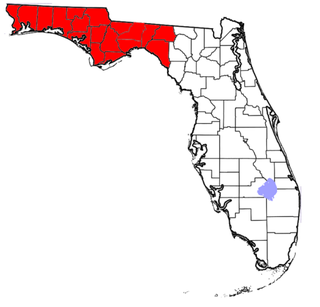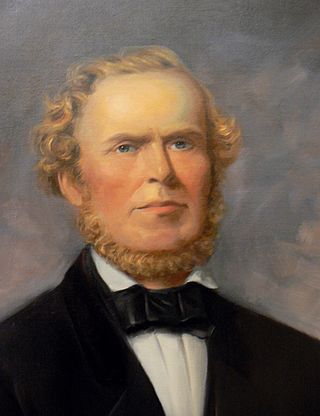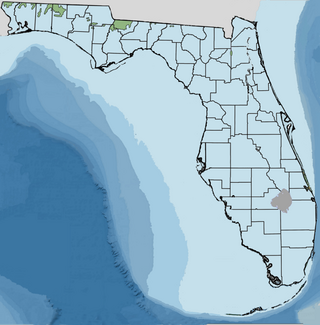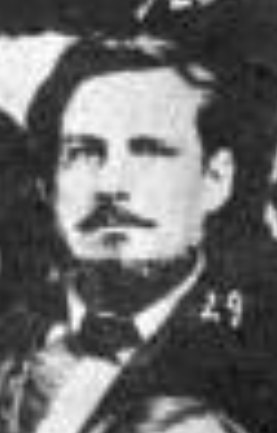
Quincy is a city in and the county seat of Gadsden County, Florida, United States. Quincy is part of the Tallahassee, Florida Metropolitan Statistical Area. The population was 7,970 as of the 2020 census, almost even from 7,972 at the 2010 census.

The Florida panhandle is the northwestern part of the U.S. state of Florida. It is a salient roughly 200 miles (320 km) long, bordered by Alabama on the north and the west, Georgia on the north, and the Gulf of Mexico to the south. Its eastern boundary is arbitrarily defined. It is defined by its southern culture and rural geography relative to the rest of Florida, as well as closer cultural links to French-influenced Louisiana, Mississippi, and Alabama. Its major communities include Pensacola, Navarre, Destin, Panama City Beach, and Tallahassee.
The United States District Court for the Northern District of Florida is a federal court in the Eleventh Circuit.
More than 1,500 African American officeholders served during the Reconstruction era (1865–1877) and in the years after Reconstruction before white supremacy, disenfranchisement, and the Democratic Party fully reasserted control in Southern states. Historian Canter Brown Jr. noted that in some states, such as Florida, the highest number of African Americans were elected or appointed to offices after the end of Reconstruction in 1877. The following is a partial list of notable African American officeholders from the end of the Civil War until before 1900. Dates listed are the year that a term states or the range of years served if multiple terms.

Florida's 2nd congressional district is a congressional district in the U.S. state of Florida. The district consists of the eastern part of the Florida Panhandle along with much of the Big Bend region along the Emerald Coast. It straddles both the Eastern and Central time zones. It includes Tallahassee, the state capital, and Panama City. With 49% of its residents living in rural areas, it is the least urbanized district in the state, and voters are generally conservative. The district is represented by Republican Neal Dunn of Panama City.

Florida AFL–CIO is a statewide federation of labor unions in the state of Florida affiliated with the AFL–CIO. The federation's membership consists of about 450 local unions from 41 international unions. The headquarters of the organization are located in Tallahassee, Florida.

The Florida First District Court of Appeal, also known as the First DCA, is headquartered in Tallahassee, Florida, the state capital. It is unique among the six Florida District Courts of Appeal in that, much like the U.S. Court of Appeals for the D.C. Circuit at the federal level, it handles most of the appeals in state administrative law matters. It is also solely responsible for handling appeals in workers' compensation cases. It is the Court of Appeals for 29 Florida counties, covering the Panhandle as well as the north-central parts of the state. The First DCA includes the following: First Circuit ; Second Circuit ; Third Circuit ; Eighth Circuit ; and Fourteenth Circuit.

Thomas Baltzell was an American lawyer and politician who was the first popularly elected chief justice of the Florida Supreme Court. Baltzell was also a Florida Territory Senator and a Florida State Representative as well as a Florida Constitutional Convention delegate for two of the state's Constitutions.
Florida Constitutional Convention of 1838 was convened on December 3, 1838, to fulfill the requirement for a United States territory being admitted to the union as a state. An act was passed by the Florida Territorial Council in 1838, and approved by Governor Richard Keith Call, calling for the election of delegates in October 1838 to a convention to be held at St. Joseph, Florida.

Florida's Hazelhurst terrace and shoreline is an ancient relict shoreline or delta present in the southeastern United States's Atlantic seaboard dating from the Late Miocene to Early Pliocene.
Florida's Constitution of 1885, its fifth, was drawn up by the Constitutional Convention of 1885. The convention was held from June 9, 1885 until August 3, 1885 in Tallahassee, Florida "for the purpose of reforming the "Carpetbag" Constitution of 1868", according to course literature from the University of Virginia. It was Florida's fifth constitutional convention and restored the election of many public officials, reduced the salaries of the governor and other state officers, made the governor ineligible for reelection, abolished the office of lieutenant governor, and provided for a legislature of fixed numbers.
The Legislative Council of the Territory of Florida, often referred to as the Florida Territorial Council or Florida Territorial Legislative Council, was the legislative body governing the American territory of Florida before statehood. The territory of Florida was acquired by the U.S. in 1821 under the Adams–Onís Treaty. Replacing the form of martial law that had existed in the territory since Florida was acquired, the U.S. Congress in 1822 established a territorial government consisting of a governor, secretary, thirteen-member Legislative Council, and judiciary, all of whom were appointed by the U.S. president.

The 1968 United States presidential election in Florida was held on November 5, 1968. Florida voters chose fourteen electors, or representatives to the Electoral College, who voted for president and vice president.

The mayor of Tallahassee is head of the executive branch of the government of Tallahassee, Florida.
The Florida Sentinel was a newspaper established in Quincy, Florida, United States and then relocated to Tallahassee, Florida where it was published from 1841 until 1865. Joshua Knowles founded the paper and Joseph Clisby became the paper's editor in Tallahassee. The newspaper office printed a journal of the Senate during its first session and reports on the Florida Supreme Court. The House also contracted with him to publish their proceedings. February 19, 1870, the paper covered an attack by alligators on circus animals being led through the Great Dismal Swamp. In 1851, the office printed the minutes of the West Florida Baptist Association annual session held October 26 to October 29, 1850, at the Union Academy Church in Jackson County.
Daniel G. McLean was an American lawyer and politician in Florida. He signed the first Florida Constitution in 1838 at St. Joseph, served in the Florida Senate including as President of the Florida Senate, served as Speaker of the Florida Territory's legislature, and was Grandmaster of the Masons. He was a Whig. He lived in Euchee Anna.
Barton C. Pope was an American lawyer and politician from the state of Florida.

Benjamin Chaires Sr. (1786–1838) was an American planter, land owner, banker and investor in Territorial Florida, and may have been the richest man in Florida in the 1830s. He was involved in the creation of the first railroads in Florida.

Samuel Barron Stephens was an American attorney and politician from the state of Florida.










